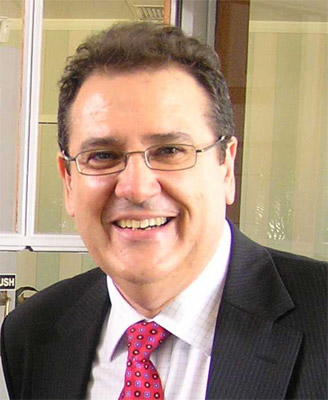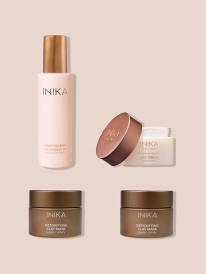Joe Tooma & Dr Jonathan Carter Falling Pap Test Figures Interview

Joe Tooma Falling Pap Test Figures Interview
The latest report from the Australian Institute of Health and Welfare (AIHW) shows the participation of Australian women aged 20-24 years having regular Pap tests every two years is both low and decreasing (falling from 47.1% in 2007-2008 to 42.8% in 2009-2010). With the report also showing this age group has the highest detection rate of high-grade abnormalities (precancerous cells) than any other age group, it is very worrying so many are putting themselves at risk of potentially serious cervical disease going undetected.
Additionally, as many of these young women are now receiving the HPV vaccine, Australia's Cervical Screening Program is undergoing a review involving an assessment of newer science and technologies like liquid-based cytology. Joe Tooma, CEO of the Australian Cervical Cancer Foundation (ACCF) says there is no better time to spread the word about Pap tests.
Tooma says "The current rate of Pap tests is particularly shocking in women aged 20-24. Complacency is an extremely alarming issue and young women need to understand that even if they have had the HPV vaccine, it only protects against 70-80% of cervical cancer caused by HPV so they still need to have regular Pap tests. Unfortunately the hard truth is the majority of women diagnosed with invasive cervical cancer have never had Pap tests."
In order to spread awareness and impart trusted information and support of the importance of regular Pap tests online where this core age group is spending a lot of their time, the ACCF has partnered with Healthshare (www.healthshare.com.au), Australia's Interactive Health Network in the Cervical Cancer online community. Women can ask questions, read expert health guides and get free information by some of Australia's leading experts in cervical disease prevention, detection and treatment. Some of the featured experts include Professor Jonathan Carter, Certified Gynaecologic Oncologist, Head of the Sydney Gynaecologic Oncology Group and Head of Gynaecology Services at the Royal Prince Alfred Hospital and Dr David Wrede, a highly experienced Obstetrician & Gynaecologist with special interests in Oncology.
The ThinPrep® Pap test, sponsor of the community, has published questions and answers and health guides available on Healthshare. The ThinPrep® Pap test, which uses liquid-based cytology, is clinically proven to be 27% more effective at detecting high-grade abnormalities than the conventional Pap test. It is also proven to be 56% more effective at finding low-grade abnormalities.
Research by the ACCF shows women under the age of 25 are more than twice as likely as older age groups to believe a Pap test is not as important for them as it is for older women. "This is another worrying figure, especially as the nature of cervical cancer means that if detected early, the disease is usually highly treatable. Awareness of the importance of regular Pap tests for these younger women despite having had the HPV vaccine is the key to prevention," added Tooma.
Additionally, as many of these young women are now receiving the HPV vaccine, Australia's Cervical Screening Program is undergoing a review involving an assessment of newer science and technologies like liquid-based cytology. Joe Tooma, CEO of the Australian Cervical Cancer Foundation (ACCF) says there is no better time to spread the word about Pap tests.
Tooma says "The current rate of Pap tests is particularly shocking in women aged 20-24. Complacency is an extremely alarming issue and young women need to understand that even if they have had the HPV vaccine, it only protects against 70-80% of cervical cancer caused by HPV so they still need to have regular Pap tests. Unfortunately the hard truth is the majority of women diagnosed with invasive cervical cancer have never had Pap tests."
In order to spread awareness and impart trusted information and support of the importance of regular Pap tests online where this core age group is spending a lot of their time, the ACCF has partnered with Healthshare (www.healthshare.com.au), Australia's Interactive Health Network in the Cervical Cancer online community. Women can ask questions, read expert health guides and get free information by some of Australia's leading experts in cervical disease prevention, detection and treatment. Some of the featured experts include Professor Jonathan Carter, Certified Gynaecologic Oncologist, Head of the Sydney Gynaecologic Oncology Group and Head of Gynaecology Services at the Royal Prince Alfred Hospital and Dr David Wrede, a highly experienced Obstetrician & Gynaecologist with special interests in Oncology.
The ThinPrep® Pap test, sponsor of the community, has published questions and answers and health guides available on Healthshare. The ThinPrep® Pap test, which uses liquid-based cytology, is clinically proven to be 27% more effective at detecting high-grade abnormalities than the conventional Pap test. It is also proven to be 56% more effective at finding low-grade abnormalities.
Research by the ACCF shows women under the age of 25 are more than twice as likely as older age groups to believe a Pap test is not as important for them as it is for older women. "This is another worrying figure, especially as the nature of cervical cancer means that if detected early, the disease is usually highly treatable. Awareness of the importance of regular Pap tests for these younger women despite having had the HPV vaccine is the key to prevention," added Tooma.
Interview with Interview with Joe Tooma
Joe Tooma, Chief Executive Officer, Australian Cervical Cancer Foundation
Question: Why do you believe the rate is decreasing?
Joe Tooma: We are concerned that the reason this is happening is that there is a lack of information and understanding about the vaccine. This is not only at the time of receiving the vaccine (generally at around the age of 12-13) but also there is almost a complete lack of information and awareness given to girls and boys as they get older and particularly in their late teens as they start becoming sexually active. Here at the Australian Cervical Cancer Foundation we have designed a Program called CCAPS- Cervical Cancer Awareness Program for Schools which is designed to give this information to students and to make them aware of the link between HPV and cervical cancers as well as other cancers so that they can make informed decisions in the future.
Question: Does the rate increase from the age of 24 years?
Joe Tooma: The report shows that about 58% of 20-24 year old women are not having their regular 2-yearly Pap tests. Some good news is that as women get older they are more likely to get Pap tests but STILL 43% of Australian women are not having Pap tests regularly enough. Generally, every year 2 million women have a Pap test- 3.5 million should be!
Question: At what age does a woman need to begin having Pap tests?
Joe Tooma: The guidelines state that once a woman becomes sexually active she should have a Pap test every 2 years between the ages of 18-70 unless advised otherwise by their GP.
Question: What can we do to encourage more Australian women to get Pap tests, as often as required?
Joe Tooma: Awareness and Information is key- women need to know that even after getting the vaccination Pap tests are essential. If cervical cancer is detected in the early stages then it is almost entirely treatable. Early detection is the key. We need women to start talking about this more amongst their friends and family so that we are reminding ourselves and our sisters, friends, mums, aunts, daughters how important getting their regular Pap test is
Question: How has Pap testing changed over the past five years?
Joe Tooma: Unfortunately what has changed most is that more women now are NOT having their Pap tests as regularly. The figures used to be 41% of women weren't having their regular Pap tests but this has now increased to 43% as this latest report shows.
It seems that when compared to 20 years ago when the National Screening Program was introduced, Pap test procedures have become a little less uncomfortable for women in recent years as Pap Test Providers have become more skilled in performing them. The instruments used now are plastic which is more comfortable than the older steel versions of the speculum. If you had a negative experience and you haven't had your Pap test for a while then we really encourage women to give it another go- things have changed.
Question: What is the main message you hope to send to women, who may be putting off having their next Pap test?
Joe Tooma: 90% of women who die from cervical cancer are from the 43% that aren't having their regular Pap tests so if you have the vaccine and you have your regular Pap tests then you are almost entirely protecting yourself from developing cervical cancer. The other important thing to do is to talk to each other- remind your mum, daughter, sister, cousin, aunt and friend how very important this is. If you are overdue your Pap or if you have never had one then do yourself a favour and book yourself in for one. If it is something you dread doing then find a GP, nurse or a women's health service who understands your needs and who you can feel comfortable with. A couple of minutes of discomfort is worth 2 years of having peace of mind!
Interview by Brooke Hunter
Question: Why do you believe the rate is decreasing?
Joe Tooma: We are concerned that the reason this is happening is that there is a lack of information and understanding about the vaccine. This is not only at the time of receiving the vaccine (generally at around the age of 12-13) but also there is almost a complete lack of information and awareness given to girls and boys as they get older and particularly in their late teens as they start becoming sexually active. Here at the Australian Cervical Cancer Foundation we have designed a Program called CCAPS- Cervical Cancer Awareness Program for Schools which is designed to give this information to students and to make them aware of the link between HPV and cervical cancers as well as other cancers so that they can make informed decisions in the future.
Question: Does the rate increase from the age of 24 years?
Joe Tooma: The report shows that about 58% of 20-24 year old women are not having their regular 2-yearly Pap tests. Some good news is that as women get older they are more likely to get Pap tests but STILL 43% of Australian women are not having Pap tests regularly enough. Generally, every year 2 million women have a Pap test- 3.5 million should be!
Question: At what age does a woman need to begin having Pap tests?
Joe Tooma: The guidelines state that once a woman becomes sexually active she should have a Pap test every 2 years between the ages of 18-70 unless advised otherwise by their GP.
Question: What can we do to encourage more Australian women to get Pap tests, as often as required?
Joe Tooma: Awareness and Information is key- women need to know that even after getting the vaccination Pap tests are essential. If cervical cancer is detected in the early stages then it is almost entirely treatable. Early detection is the key. We need women to start talking about this more amongst their friends and family so that we are reminding ourselves and our sisters, friends, mums, aunts, daughters how important getting their regular Pap test is
Question: How has Pap testing changed over the past five years?
Joe Tooma: Unfortunately what has changed most is that more women now are NOT having their Pap tests as regularly. The figures used to be 41% of women weren't having their regular Pap tests but this has now increased to 43% as this latest report shows.
It seems that when compared to 20 years ago when the National Screening Program was introduced, Pap test procedures have become a little less uncomfortable for women in recent years as Pap Test Providers have become more skilled in performing them. The instruments used now are plastic which is more comfortable than the older steel versions of the speculum. If you had a negative experience and you haven't had your Pap test for a while then we really encourage women to give it another go- things have changed.
Question: What is the main message you hope to send to women, who may be putting off having their next Pap test?
Joe Tooma: 90% of women who die from cervical cancer are from the 43% that aren't having their regular Pap tests so if you have the vaccine and you have your regular Pap tests then you are almost entirely protecting yourself from developing cervical cancer. The other important thing to do is to talk to each other- remind your mum, daughter, sister, cousin, aunt and friend how very important this is. If you are overdue your Pap or if you have never had one then do yourself a favour and book yourself in for one. If it is something you dread doing then find a GP, nurse or a women's health service who understands your needs and who you can feel comfortable with. A couple of minutes of discomfort is worth 2 years of having peace of mind!
Interview by Brooke Hunter
MORE
- Menstrual Period Management
- The Secret to Weight Loss
- Feeling The Pain: How To Tackle Period Pain
- Period Pain and How to Survive It
- Gender Specific Medicine
- Helping Women To Start Those 'Difficult'...
- Michelle Boyd Ellura Interview
- Menopause Does Not Protect Women From Cervical...
- Five Ways to Balance Hormones
- Do You Really Know What Is Going On Down There?
- Do You Know Your Breasts?
- Dr. Stan Goldstein Sexual Health Choices Interview
- Breast Health Decision Question and Answers
- Breast Cancer Treatment Impacts Patients' Sex...
- Bladder Weakness More Common Than Hay Fever
- Belinda Reynolds How To Manage UTI's Naturally...
- Treat Bones Like Breasts
- Mammogram Technology
- Soodox for Women
- Chlamydia Most Commonly Reported STI In Australia
- Time For Reflection Is Great For Mental Health



